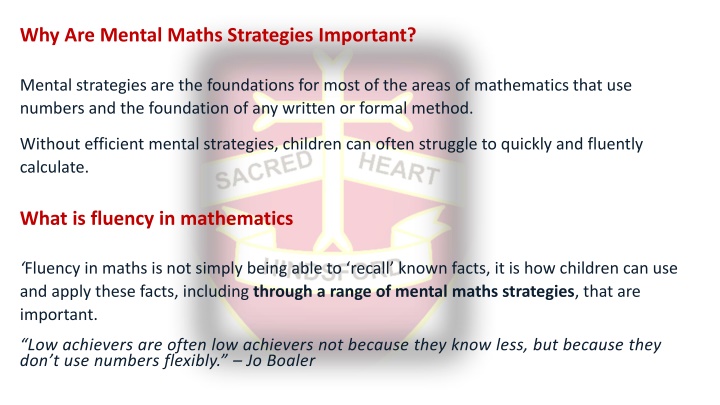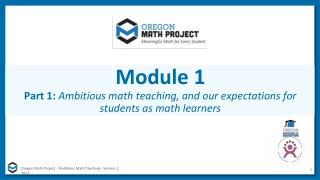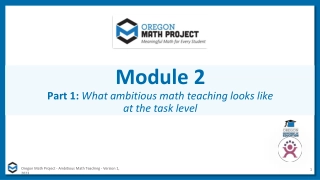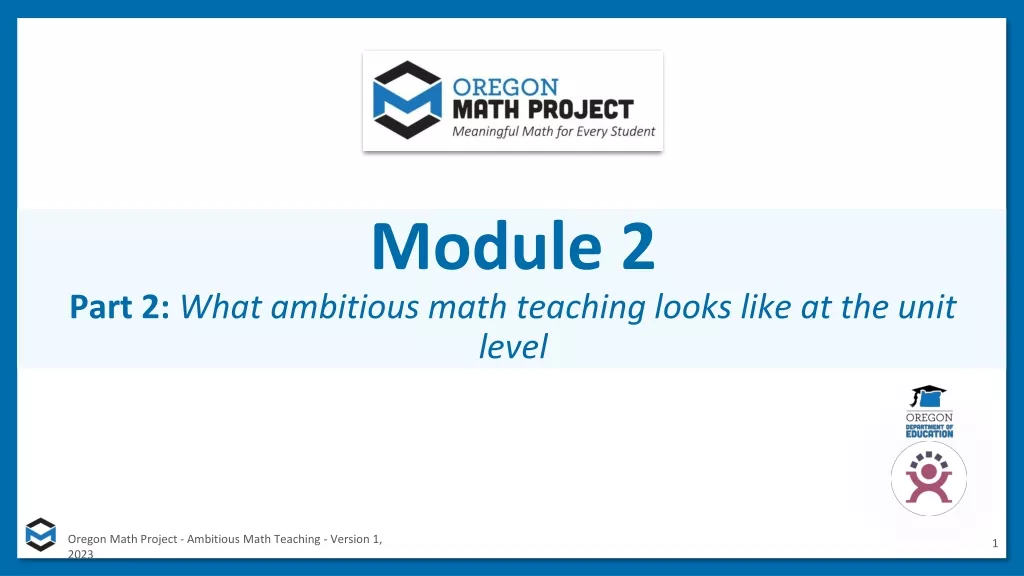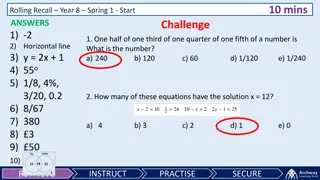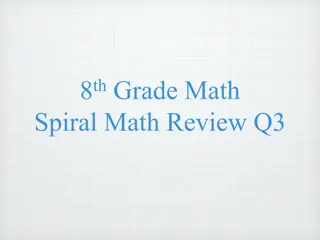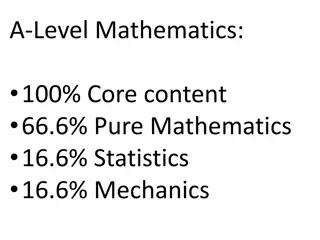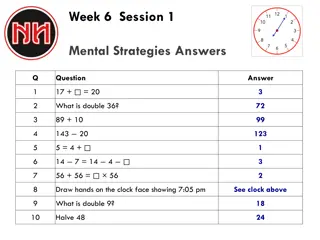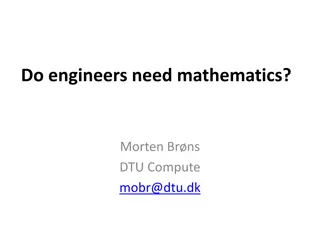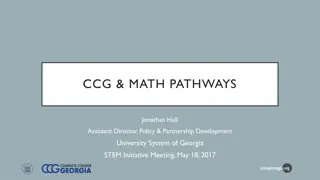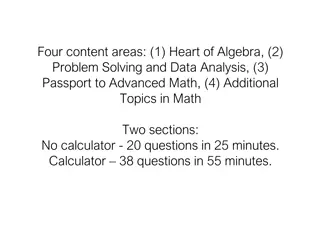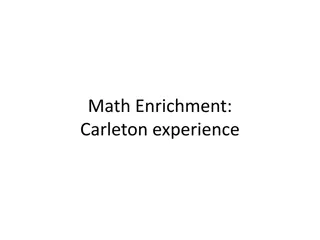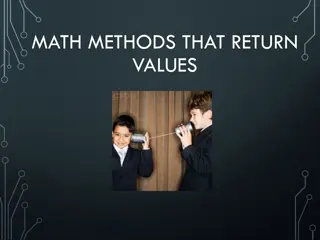Importance of Mental Math Strategies in Mathematics
Mental maths strategies are essential for building a strong foundation in mathematics, enabling children to fluently apply number sense and calculations. Developing number sense in key stages aids in fluency and flexible thinking. Building mental calculation skills goes beyond recalling facts to understanding relationships between operations.
Download Presentation

Please find below an Image/Link to download the presentation.
The content on the website is provided AS IS for your information and personal use only. It may not be sold, licensed, or shared on other websites without obtaining consent from the author.If you encounter any issues during the download, it is possible that the publisher has removed the file from their server.
You are allowed to download the files provided on this website for personal or commercial use, subject to the condition that they are used lawfully. All files are the property of their respective owners.
The content on the website is provided AS IS for your information and personal use only. It may not be sold, licensed, or shared on other websites without obtaining consent from the author.
E N D
Presentation Transcript
Why Are Mental Maths Strategies Important? Mental strategies are the foundations for most of the areas of mathematics that use numbers and the foundation of any written or formal method. Without efficient mental strategies, children can often struggle to quickly and fluently calculate. What is fluency in mathematics Fluency in maths is not simply being able to recall known facts, it is how children can use and apply these facts, including through a range of mental maths strategies, that are important. Low achievers are often low achievers not because they know less, but because they don t use numbers flexibly. Jo Boaler
Developing Number Sense in Key Stage 1. A solid foundation in number properties is central to pupils success in developing and applying mental maths strategies. In Key stage 1 children explore the development of number properties as pre-requisites for the development of mental maths strategies. i.e. they develop Number Sense Number sense is a person's ability to understand, relate, and connect numbers. Children with strong number sense think flexibly and fluently about numbers. http://buildingnumbersense.blogspot.com/p/number-talks.html
Why focus on Number Sense? Children who struggle in maths often lack number sense. What is Number Sense? Children with strong number sense have: A sense of what numbers mean. Someone with a sense of what numbers mean has a visual model and concrete understanding of quantities. An ability to look at the world in terms of quantity and numbers.(i.e. When is 100 a lot? When is it not very much?) An ability to make comparisons among quantities. For example, they know that 300 is 400 away from 700 by using a mental number line, or know that there is a bigger difference between 50 and 150 than between 1,000 and 1,050.
Throughout year 3 and 4 children have been applying their knowledge and understanding of number sense from Key Stage 1 to developing a range of mental strategies. Children have access to a range of manipulative or concrete resources to support their understanding.
Is mental calculation the same as mental arithmetic? For many adults, mental calculation is about doing arithmetic; it involves rapid recall of number facts knowing your number bonds to 20 and the multiplication tables to 10 10. Rapid recall of number facts is just one aspect of mental calculation. Children are presented with calculations in which they have to work out the answer using known facts and not just recall it from a bank of number facts that are committed to memory. Children should understand and be able to use the relationship between the four operations and be able to construct equivalent calculations that help them to carry out such calculations.
Mental strategies introduced from Year 1: Using number pairs to 1, 10, 100 etc. Adding near multiples of ten and adjusting; Partitioning and Recombining; Bridging though ten; Use relationships between operations; Using known number facts; Doubling and near doubling; For example, if I know that double 250 is 500 then 250 + 260 will double 250 add 10. Counting on; For example, because the difference between 134 and 128 is going to be small, I can count on from 128 to 134.
Using number bonds (pairs) to 1, 10, 100 etc. 8 + 2 = Which other related calculations can we find?
Which related calculations can we find? 0.1 0.01 10 100 1000
How would we use number bonds to solve the following calculations? 136 + 214 = 7.2 + = 10 Could this calculation be correct? Explain your reasoning. 5260 3182 = 2077
Throughout year 3 and 4 children have secured their understanding of place value. Can you explain what happens to the digits within these calculations? 245 + 30 = 245 + 300 =
Adding near multiples of ten and adjusting. What do you notice about 29 that might help you?
How could we solve these calculations through rounding and adjusting? 5642 + 3999 = 3456 - 1998 = 3013 1500 =
How could we use partitioning and recombining to solve these calculations? 245 + 153 = 245 + 100 + 40 + 3 = 3256 + 4523 = 5984 2762 =
Using partitioning to bridging through 10 or 100 (applying number bonds) 78 + 34 = 167 + 58 = 32 + 2 33 + 25 78 + 2 = 80 167 + 33 = 200 80 + 32 = 112 200 + 25 = 225
Ultimate Mental Maths Pack 370 37 x 10 = H T O 3 7 3 x 10 7 0 Answer
Ultimate Mental Maths Pack 900 9 x 100 = Th H T O 9 x 10 9 0 x 100 9 0 0 Answer
Ultimate Mental Maths Pack 1,100 11 x 100 = Th H T O 1 1 x 10 1 1 0 1 1 0 0 x 100 Answer
Ultimate Mental Maths Pack 23 230 10 = H T O 2 3 0 2 3 10 Answer
Ultimate Mental Maths Pack 800 100 = 8 Th H T O 8 0 0 10 8 0 100 8 Answer
Ultimate Mental Maths Pack 17 1,700 100 = Th H T O 1 7 0 0 10 1 7 0 1 7 100 Answer
Ultimate Mental Maths Pack 2 x 6 = 12 2 x 60 = 120 2 x 600 = 1,200 Answers
Ultimate Mental Maths Pack 150 50 x 3 = 15 3 x 5 = 1,500 30 x 50 = Answers
Ultimate Mental Maths Pack 4,900 7 x 7 x 100 = 490 7 x 10 x 7 = 49 7 x 7 = Answers
Ultimate Mental Maths Pack Using the number cards below as two factors within a multiplication calculation, find ways of making 100. 25 5 10 10 4 50 20 2 2 x 50 4 x 25 5 x 20 10 x 10 100 Answers
Ultimate Mental Maths Pack 40 2 x 4 x 5 = 90 5 x 9 x 2 = 30 3 x 2 x 5 = 50 5 x 5 x 2 = Answers
Ultimate Mental Maths Pack 900 9 x 5 x 20 = 600 4 x 6 x 25 = 25 x 7 x 4 = 700 5 x 21 x 2 = 210 Answers
Ultimate Mental Maths Pack Jamie buys a t-shirt for 19.99, socks for 2.49 and a pair of fancy trainers for 99.99 He has 130.97 in his bank account. How can he quickly check if he has enough money to buy everything he wants? 19.99 + 2.49 + 99.99 This is approximately 20 + 2 + 100 = 122 He has enough money to buy all the items. Answer
Ultimate Mental Maths Pack Round to the nearest 100: 800 823.11 800 900 387.95 400 300 400 Answers
Ultimate Mental Maths Pack Round to the nearest 1,000: 10,000 9,765.87 9,000 10,000 7,499.99 7,000 7,000 8,000 Answers
Ultimate Mental Maths Pack Round to the nearest 1,000: 5,000 4,687.99 4,000 5,000 3,888.79 4,000 3,000 4,000 Answers
Ultimate Mental Maths Pack Approximately how much money is being spent? 4,157 1,170 + 2,987 = 1,000 + 3,000 = 4,000 Approximately 4,000 is being spent. How much money is being spent exactly? Answer
Ultimate Mental Maths Pack Approximately how much change will I get? 2,766 5,989 3,223 = 6,000 3,000 = 3,000 Approximately 3,000 in change How much change will I get exactly? Answer
Findings from the 2022 SATs Tests taken from Third Space Learning
Using Mental Strategies In The SATs Tests Mental maths appears six times in the content domain breakdowns for the KS2 Mathematics test framework and is one of the factors the national assessments are trying to assess. SATs Tests Arithmetic Test Efficient mental calculation strategies are key to success in the KS2 SATs Paper 1- Arithmetic. In the Arithmetic paper, over 80% of questions are designed to be able to be solved mentally, or through jottings. The children are expected to answer 36 questions in 30 minutes. Less than a minute per question! Having a bank of mental calculation strategies would help the children to answer some of these questions with speed and fluency. Some of the questions are set out to encourage written methods, for example those requiring the children to answer long multiplication and division calculations. However, many children attempt the majority of the paper using formal written methods, which leads to them running out of time and not completing the paper.
